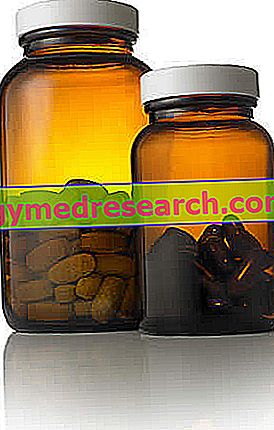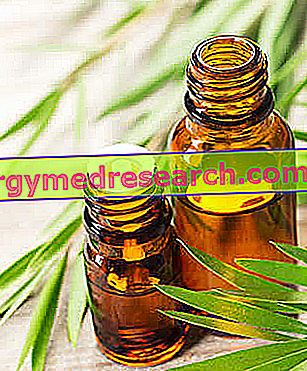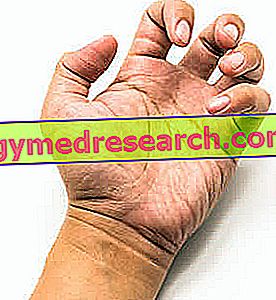Generality
Biotin, also known as vitamin H or vitamin B7, is an essential micronutrient, belonging to the group of B vitamins.
Taken through food of animal origin - such as veal, pork, lamb, chicken, cheese, eggs and fish - or of vegetable origin - such as cauliflower, mushrooms, carrots, spinach and beans - Biotin is absorbed intestinal (ileum), and transported first to the liver and subsequently to the various tissues.
In these tissues Biotin fulfills its metabolic role, acting as a coenzyme, in numerous metabolic pathways.
Classically, Biotin, as a supplement, is part of the formulation of multivitamins and supplements and cosmetics intended to maintain the integrity of skin appendages, such as nails and hair.

Biotin - chemical structure
Indications
Why is Biotin used? What is it for?
Biotin is a valuable vitamin for the entire cellular economy, as a coenzyme of numerous enzymes, known as carboxylases, particularly active in intermediate metabolism.
Enzymes such as Pyruvate carboxylase, Proprionyl CoA carboxylase, Methylcrotonyl Coa Carboxylase and AcetylCoA carboxylase are some of the main enzymes involved in the metabolism of sugars, fats and proteins, which require the intervention of Biotin.
Precisely because of its precious metabolic role, Biotin would be useful in:
- Treatment of some congenital enzyme deficiencies;
- Improvement of sugar metabolism, compromised in some diseases such as diabetes;
- In improving the quality of skin appendages, as shown in particular pediatric conditions characterized by the presence of thin and fragile hair;
- In improving nail quality;
- In the improvement of intermediate metabolism.
Despite some encouraging evidence, for many of the aforementioned activities there is still no clinical trial worthy of note that can support the hypotheses formulated.
Property and Effectiveness
What benefit has Biotin shown during the studies?
Leaving aside the rare enzyme deficiencies, for which Biotin becomes a key element, the studies are somewhat divided on the real usefulness of integration with Biotin.
At the moment Biotin would seem useful in:
- Improve the glycemic profile and the condition of insulin resistance in patients suffering from type II diabetes;
- Stop hair loss in patients with Biotin deficiency. The anti-fall effects of Biotin on individuals with normal values of this Vitamin would be decidedly reduced;
- Improve the thickness and integrity of the nails.

Doses and method of use
How to use Biotin
Classically, Biotin, in the form of supplements, is present in the formulation of multivitamin supplements.
In these, the average dosage of Biotin is very varied, sometimes reaching 2, 000 mcg, a decidedly higher quantity than recommended (about 30 mcg / day)
Biotin online

A 365 tablet Biotin supplement is available online to ensure a product supply for an entire year. This supplement can help the growth of hair, eyelashes and eyebrows, and can also stimulate nail strength and growth.
To get all the benefits of this supplement, simply take a tablet daily, which thanks to its small size is easily swallowed with minimal effort by anyone. The integrator is entirely produced in the United Kingdom, thus ensuring compliance with the highest quality standards. It is also free of artificial colorings and aromas, and also suitable for vegetarians.

Alternatively, you can buy a supplement of Biotin enhanced with Zinc, useful to combat hair loss and improve the shine of skin, nails and beard. Free of additives, this supplement is suitable for vegetarians and vegans, and is also free of gluten, starch and lactose.
Biotin, in combination with Zinc, can be useful in the treatment of alopecia and early hair and beard fall, because it helps it grow and thicken. It is a valid natural alternative to fall vials. It also improves the fragility and thickness of the nails. Relieves skin irritation and dry skin. It also does not contain Magnesium Stearate, which is an additive found in many supplements.
Side effects
The use of Biotin is generally safe and well tolerated.
Overdose up to 10 mg / day did not show any particular signs of toxicity.
Contraindications
When should Biotin not be used?
The use of Biotin is contraindicated in case of hypersensitivity to Vitamin or structurally related molecules.
Pharmacological Interactions
Which drugs or foods can modify the effect of Biotin?
The use of anticonvulsants such as carbamazepine, phenytoin or phenobarbital, especially if prolonged over time, could reduce the plasma concentrations of Biotin, due to an increase in its metabolism.
Antibiotics and Pantothenic Acid (vitamin B5) could reduce systemic concentrations of Biotin, reducing the amount normally synthesized by intestinal microflora.
Precautions for use
What do you need to know before taking Biotin?
During pregnancy and in the subsequent period of breastfeeding, the intake of supplements with amounts of Biotin higher than the Adequate Assumption defined by the LARN should be avoided.
In this case, the use of Biotin should not exceed 35 mcg daily in these circumstances.
Sponsored content: My-personaltrainer.it presents products and services that can be purchased online on Amazon and / or on other e-commerce sites. Whenever a purchase is made through one of the links on the page, My-personaltrainer.it could receive a commission from Amazon or other cited e-commerce. We inform you that the prices and availability of the products are not updated in real time and may change over time, so we invite you to check availability and price on Amazon and / or on other cited e-commerce.



